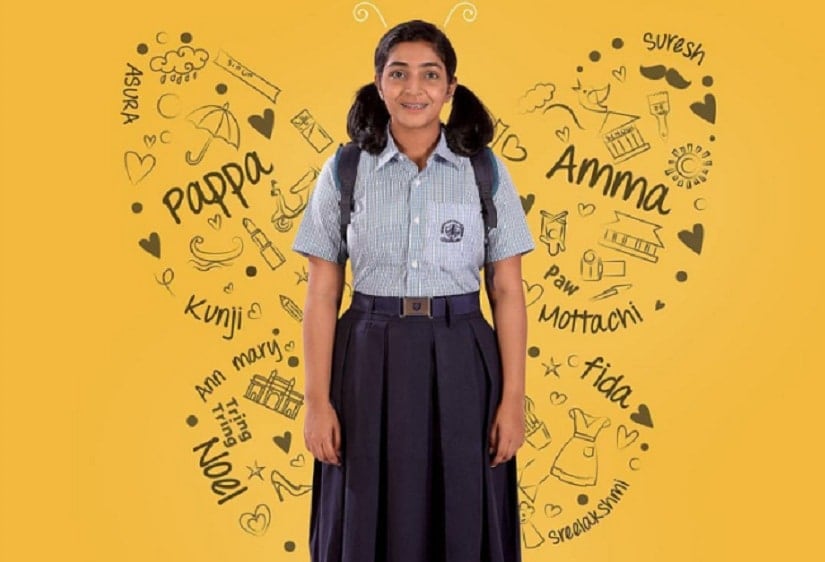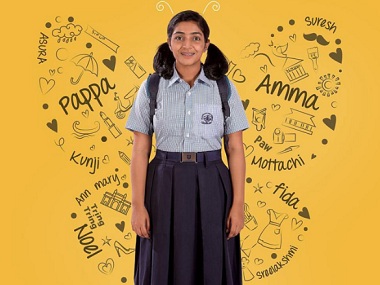Rajisha Vijayan represents the young blood in Malayalam cinema, who are not afraid to be choosy, are extremely serious about cinema, and have an opinion about everything under the sun. A successful former TV anchor, and an actor who won a State Award for her debut film Anuraga Karikkin Vellam (2016), she will be seen after a gap of two years in debutant director Ahammed Kabeer’s June, in which she plays the titular role of a girl who ages from 15 to 25. More from the actress… June is yet again that rare film around a female actor… I got the script two years back. I was with my mom, and I was surprised by the way she was reacting to the script. It’s a very light-hearted film; it makes you laugh, cry and nostalgic. I felt so good that three men could write such a sensitive story about a girl. At least 17 producers turned it down, as the film was helmed by a new team and didn’t have a popular star. Also, we weren’t just looking at the money, we wanted a production house that would market it in the right way. Vijay Babu’s Friday Film House was a godsend. [caption id=“attachment_6102491” align=“alignnone” width=“825”]  Rajisha Vijayan in June. Image via Twitter[/caption] It’s also surprising that after the brilliant Anuraga… (2016), very few exciting films came your way. It’s even more sad that despite a new wave hitting Malayalam cinema, a film like June still had to struggle so much to find a producer… It’s the reality of our times. I knew I had June (committed soon after Anuraga..), so that helped. And nothing as exciting came my way. I chose my second and third film to help break the image of Elli (from Anuraga Karikkin Vellam). Since the character had registered so much with the audiences, I was apprehensive whether I will ever be able to break free from her. Luck and timing play a big part, I guess. I heard the most difficult part for you was to cut your long tresses… I was ready to forsake it for my character, but I was not okay at a very personal level. Soon after I wore the uniform and turned into June, I was fine. But that moment when it was chopped was painful, as long hair was part of my identity. In a way, it helped me realise that physical transformation helps in decreasing the distance between me and the character. When you look more like the character, it helps in the transition. With a male hero, you can experiment with moustache, beard and hair but female actors have very few avenues to make physical changes to their characters. We tried out six haircuts, worked on the eyebrows, and added braces too. How far would you stretch for a character’s physical transformation? I am fine with gaining and losing weight. As an actor, when you commit to a character, you are like clay, and anyway it’s already a given that you must invest emotionally. What’s your process as an actor? Probably I am more inclined towards method acting (not the extreme form though). I need to think and understand the character. I need to believe to some extent that I am that person. With theatre, you must be physically agile, rehearse like crazy and know that if you slip, you are gone. Theatre is so dramatic, but the core remains the same. Even after the shoot, it lingers on. That is the hardest part. Did it take time to slip into the character of June? The character was with me for two years, it was right there on my bedside table. I tried to change myself. Every time I sweated out at the gym, I knew I was doing it for June. The kind of metre you want to catch was another aspect; there’s a metre for bubbliness and maturity also. Finally, the best thing is to follow your director, no one understands her better. The reactions to my co-stars were very important; I needed to believe that Joju Chettan (the actor who plays her father) is my father, otherwise it would affect my reactions. The newcomers and seasoned actors were amazing. Elli was annoying, nagging, silly, lovable. It wasn’t a typical celluloid female sketch nor an easy character to like. What excited and worried you about her? I had a lot of conflicts with her as I felt irritated with her on so many levels. ‘Can I please be a little more pleasant now?’ I would ask the director. Honestly, I was sure people would smirk and hoot at her, especially during the scenes where she drinks beer and showers abuses. But my judgement was completely wrong. The initial scenes were hard, where she constantly follows him, questioning her own self-worth in the process, as I am nothing like that. After the interval, I started liking her a bit. Considering the kind of discourses on social media about sexism and misogyny in cinema, are you more careful about what your character depicts on screen? As a representative of a gender identity, you have to be responsible, regardless of what is being written. Your opinion shouldn’t be based on someone else’s, like watching biased news channels. It’s important to show the atrocities that happen in society, but it’s also about how the character justifies their act. If a man stalks a woman, as long as you don’t show it as a heroic act, and instead say that it’s wrong, it’s fine. Romanticising it is not okay. Nimisha Sajayan recently said after #MeToo movement, she felt exploitation in cinema has drastically come down. Have you felt that? So far in my career, I haven’t been subjected to the casting couch. Having said that, I am also not denying that it doesn’t happen. Just because I am safe, doesn’t mean the rest are. I think this is the right time to come out and call out such people. The more they come out, the less it will happen. It’s amazing to hear these stories and you should listen and trust them even if they have taken 10 years to come out. I don’t think the timeline matters. Of course, it can also be easily misused. So, one needs to be careful before using the hashtag as a lot of lives are also at stake. Who are the female characters in cinema that inspired you? The bullet-riding, tattoo-sporting, jacketed woman is not my idea of a bold character. Revathy throwing her anklets and saying you don’t define my dancing abilities or my future in Devasuram, what Clara did in Thoovanathumbikal, which makes a man go like, ‘What?!’—that’s bold. All Padmarajan and Bharathan films which explored the innate strength of a woman have such characters. Nowadays, I think Syam Pushkaran’s scripts have women with strength of character. I was floored by the female characters in Kumbalangi Nights, Mayaanadhi and Thondimuthalum Driksakshiyum. What was the big change that came from the Kerala State Award for Best Actress? Apart from adding more beauty to my glass shelf, you mean? It reinstated belief in my career choice. And a lot of people realised my name was Rajisha and not Elli.
June actress Rajisha Vijayan says she was floored by the female characters in Kumbalangi Nights, Mayaanadhi and Thondimuthalum Driksakshiyum.
Advertisement
End of Article


)
)
)
)
)
)
)
)
)



